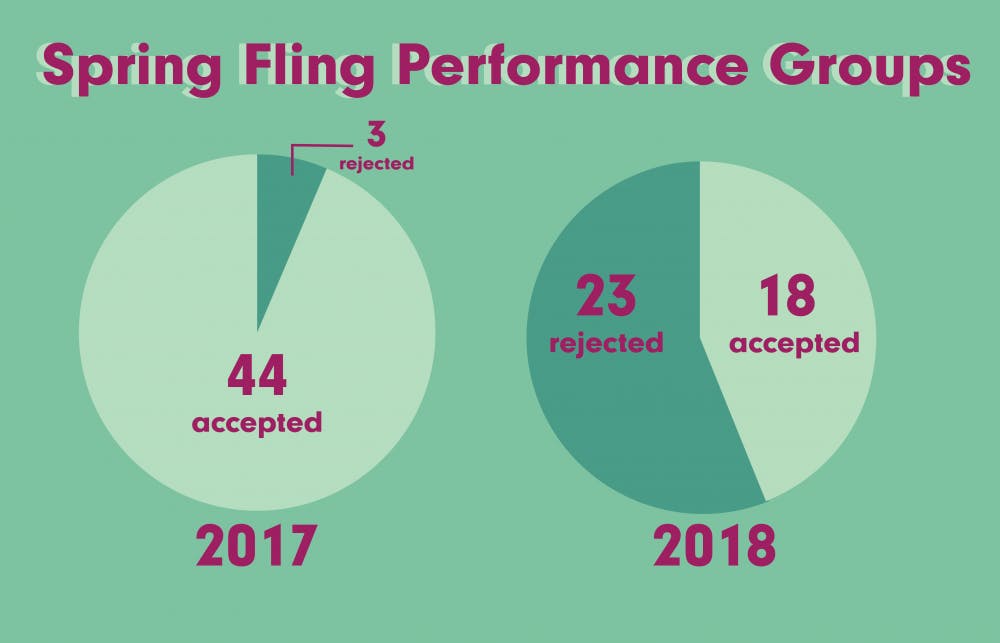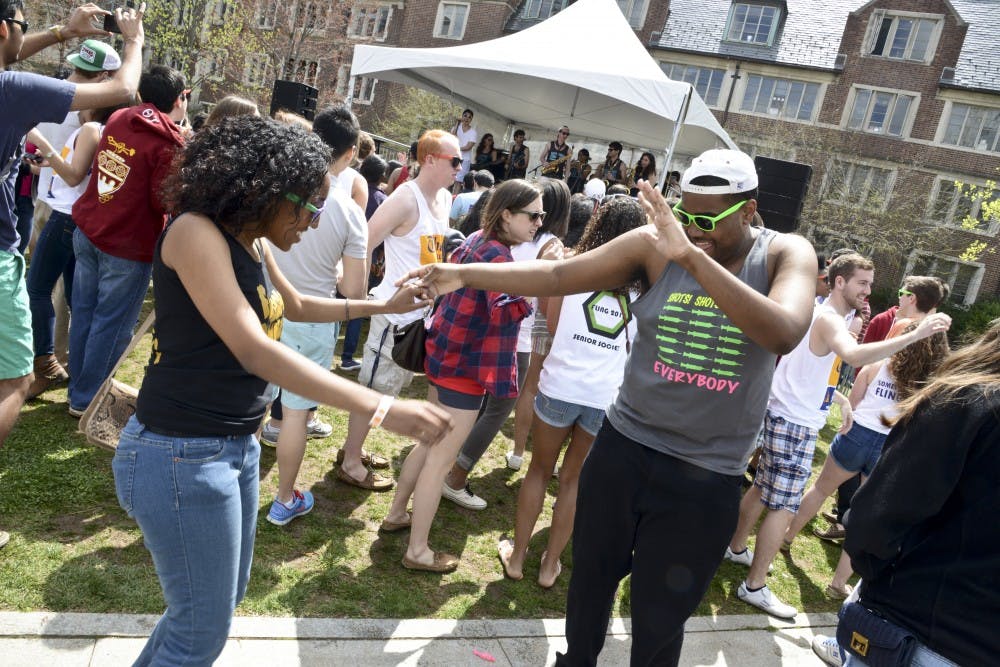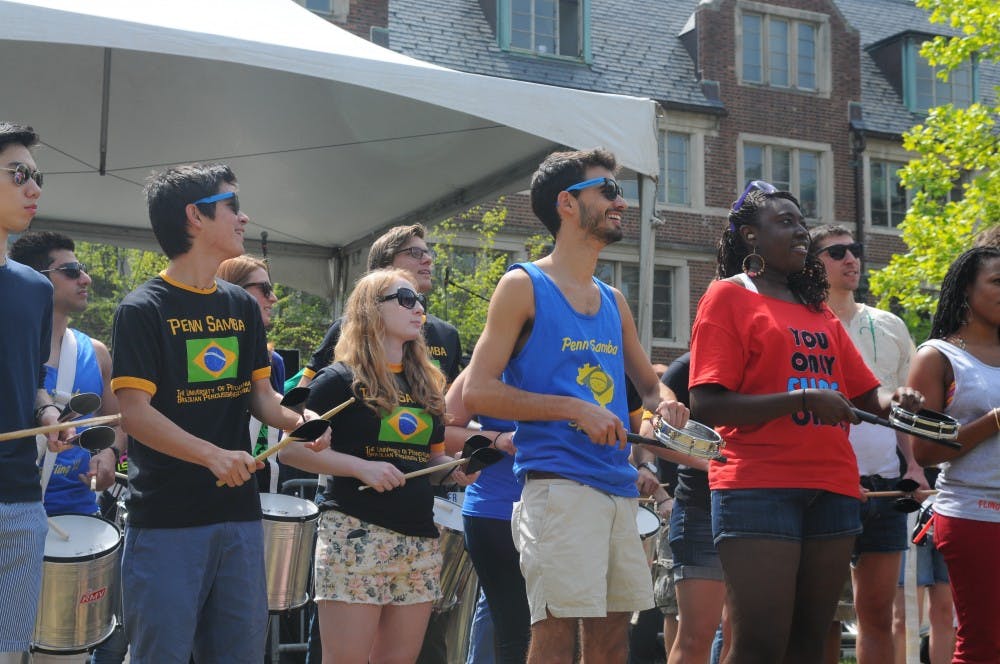
With Spring Fling festivities shortened from the traditional two-day-long event with multiple stages to a single-day event with one stage, the Social Planning and Events Committee Fling directors had to reject 23 of the 41 student groups who applied to perform.
This year, 18 student performing groups will perform at Spring Fling. Last year, 44 groups were given gigs at fling out of the 47 that applied.

Although the Fling directors said they wished it was possible to continue welcoming and promoting the different clubs on campus, the shortened time frame and lack of a second stage forced them to reduce the number of performers. Although the number of performance groups from last year to this year has decreased by 59 percent, performances will each last 15 minutes as usual.
In past years, “essentially, we just accepted everyone,” Fling co-director and College sophomore Christopher Mountanos said.
About three performing groups were rejected each year, according to SPEC Fling directors, and the cuts for Fling 2017 were only due to groups not meeting requirements, such as including at least one Penn student within the group.
Performance groups were not warned in advance that it would be more competitive to get a slot at the upcoming Fling. Fling directors said this is partly because SPEC was still deciding how to maximize the number of performers. “We weren’t 100 percent sure how many people we were exactly going to cut,” said Mountanos, who is also a social media staffer for The Daily Pennsylvanian.
Directors also assumed performers knew it would be a more selective process this year after the time and space constraints were announced. “It was implicit,” Fling liaison and College junior Julia DaSilva said.

College junior Callie Holtermann, who is co-president of Counterparts — an a cappella group performing at Fling this year — “was not aware” that there would be severe cuts this year. Holtermann said she still does not know the extent of how many groups were included and rejected.
Mask and Wig member and College junior Eric Calvo said that while he expected cuts to be even more severe, he would have appreciated more explicit information about selectivity.
“As far as I know, we didn’t receive any forewarning about any of the changes to Fling before it was announced in the DP,” Calvo said. Wanting to have been more informed about the changes to Fling group performances “is a general sentiment among student performers,” Calvo said.
Three Fling organizers each rated the applicants between one and 10 to decide who to accept as performers.
Fling co-director and Wharton sophomore Linda Ashmead said SPEC made an effort to represent diverse types of performers in the selection, including DJs, a cappella groups, bands, and solo acts. DaSilva acknowledged, however, that they tried to pick groups that matched "more of a festival feel" that could fit into the "vibe" of Fling the directors are aspiring for.
The Penn Glee Club Band, which had performed at Fling for several years in a row, at first decided not to apply to perform at Fling this year.

Glee Club Director and Engineering junior Will Drobnick said some members of the group were disinterested in performing after hearing Fling would only take place at Penn Park. In previous years, Drobnick said it was easy to transport equipment to the Quad from Platt Performing Arts House, a common practice and storage space for student performing arts groups.
Once the Glee Club decided to apply despite the logistical challenges, the application deadline had passed.
“All in all, we’re not the most disappointed about missing the deadline. [Penn Park] is so far away and from what I hear, the time slots are really rough this year to get," Drobnick said. He added, however, that the Glee Club plans on applying to perform at Fling next year.
SPEC members hope that the Fling changes will also have some perks for student performers. “It’s a little more centralized now,” Mountanos said. “I feel since it’s only one day, people will be more willing to come.”

In addition, each performance may get more attention with the one-stage setup. Since more than one show occurred simultaneously in the Quad, “some groups don’t get that much of an audience,” Calvo said.
Drobnick expressed concern for lesser-known performers who may not have a chance to play at Fling, "especially for those students who really used Fling to get their stuff out there."
“They probably aren’t given any time this year," Drobnick said. "I think it’s a shame, not only as a musician but also as a student.”
Fling directors are hoping to create some sort of rotation system for the future so different student groups will have the opportunity to perform at Fling throughout the years.
SPEC Fling worked with PennLabs and released the official Spring Fling timeline on PennLabs’ app, PennMobile, along with a promotional video of Fling’s student performers this week.
The directors emphasized their apologies for the increase in selectivity this year. “This wasn’t meant to be a way to cut student groups we thought were bad performers or anything like that,” DaSilva said. “It literally was just a slot and time sort of decision.”
“It shouldn’t be a high-stress thing,” Mountanos added. “We’re just here to relax and have fun and really just appreciate the students here and all the work that they do.”
The Daily Pennsylvanian is an independent, student-run newspaper. Please consider making a donation to support the coverage that shapes the University. Your generosity ensures a future of strong journalism at Penn.
Donate







